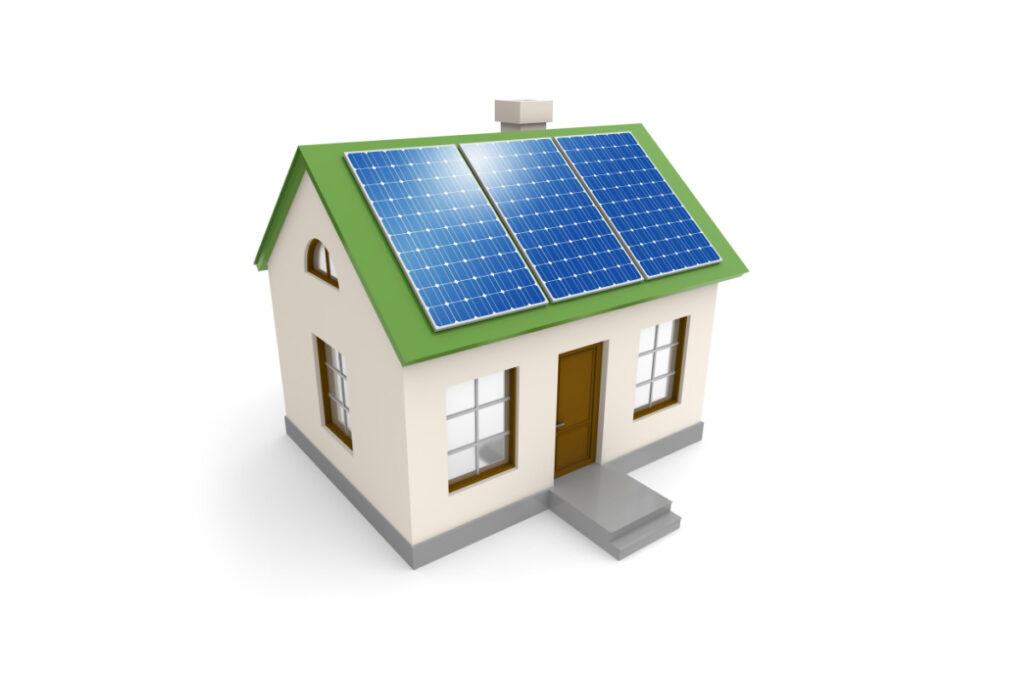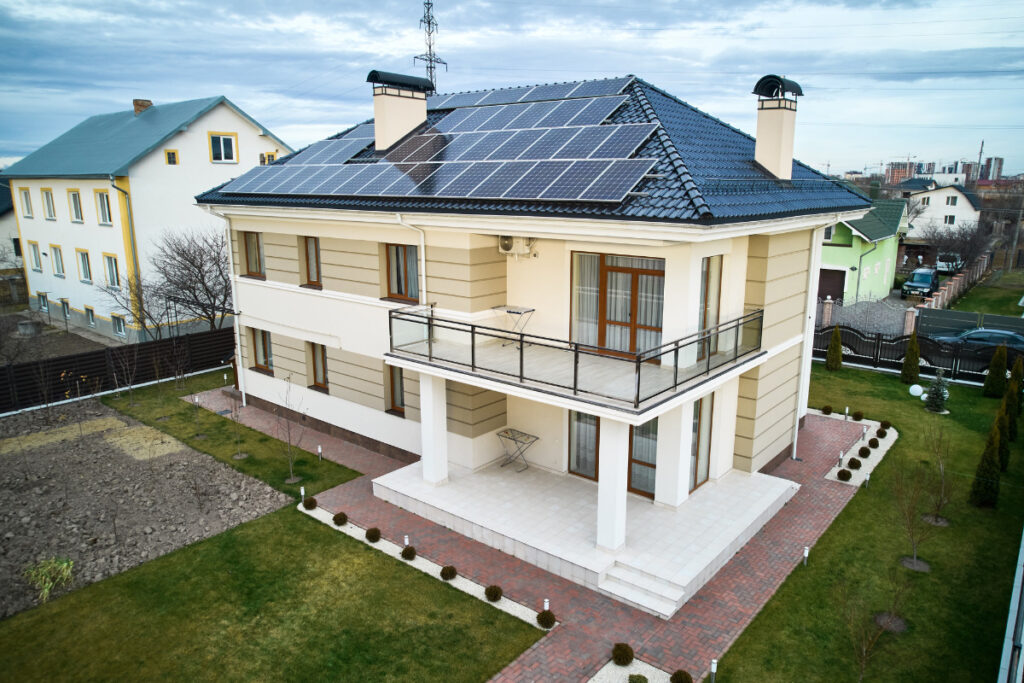Introduction
As the world increasingly embraces clean energy, installing solar panels with Appalachian Power has become an attractive option for residential users seeking to reduce their environmental impact while saving on energy costs.
This comprehensive guide will give you all the home solar panel installation information. It will cover everything from understanding your options and determining your needs to securing financing and ensuring proper maintenance for years of eco-friendly power generation.
| Key Takeaways |
|---|
| Solar panels are an eco-friendly and cost-effective way to generate clean, renewable energy for residential use with Appalachian Power. |
| Choosing the right size of solar panel system is crucial to ensure that it meets your household's needs while keeping within budgetary constraints. |
| Installing solar panels requires proper evaluation of your home's solar potential, applying for interconnection with Appalachian Power, obtaining necessary design options and permits, and undergoing installation by a qualified installer. Regular maintenance check-ups are also important for ensuring optimal performance. |
| Homeowners can take advantage of federal tax credits and incentives offered by Appalachian Power as well as financing options like payment plans to make the upfront costs more manageable when considering installing solar panels. |
Understanding Solar Panels For Residential Use With Appalachian Power
Solar panels convert sunlight into electricity, which can be used for residential purposes. They work by capturing photons from the sun and transforming them into electrons, creating an electric current that can power homes with Appalachian Power.
What Are Solar Panels And How Do They Work?
Solar panels harness the sun’s power and convert it into clean, renewable energy for residential use. They contain photovoltaic (PV) cells that capture sunlight and transform it into direct current (DC) electricity through the photovoltaic effect.
However, the DC electricity generated by solar panels is incompatible with most household appliances, which typically run on alternating current (AC) power. An inverter is utilized to convert the DC output from the solar panels into usable AC power to address this.
The utilization of solar panels for residential purposes is both eco-friendly and cost-effective. Installing these energy-generating systems on rooftops or other open spaces around your property reduces your dependence on non-renewable resources such as coal or natural gas while enjoying significant savings on monthly utility bills.
Benefits Of Solar Panels For Residential Use
Installing solar panels on your home with Appalachian Power can bring numerous benefits. Solar energy is a clean and renewable power source, making it an eco-friendly option for homeowners who want to reduce their carbon footprint.
By installing solar panels, you can help reduce greenhouse gas emissions and support sustainable living efforts in your community. Additionally, solar panel installation can help you save money on electricity bills over the long term by generating your own power instead of relying solely on the grid.

Choosing The Right Size Of Solar Panel System Based On Energy Consumption
To choose the right size of solar panel system for your home, it’s essential to consider your energy consumption. You can determine this by looking at your electric bills and identifying how much energy you use on average each month.
The more electricity you consume, the larger the solar panel system you need to install.
For example, a family of four in a large house with a lot of air conditioning during hot summers may require a more extensive solar panel system than a single person living in an apartment.
By evaluating your energy usage and consulting with professionals from Appalachian Power, you can ensure that the size of your installed solar panel system is appropriate for your household needs while keeping within budgetary constraints.
Steps To Installing Solar Panels With Appalachian Power
Once you have evaluated your home’s solar potential through an assessment, applying for interconnection is the next step in the solar panel installation process with Appalachian Power. This involves obtaining the required design options and permits for installation.
Once approved, a professional installer will handle the installation process and inspections to ensure that everything meets safety standards.
Evaluating Your Home’s Solar Potential With An Assessment
To determine if your home is a good candidate for solar panels, it’s important to have a professional assessment done. During the evaluation, a solar expert will look at your roof orientation, shading issues, and other factors that may affect the efficiency of your system.
This assessment helps ensure that you are making an informed decision about installing solar panels in your home. It also provides valuable information regarding potential energy savings and return on investment.
Applying For Interconnection With Appalachian Power
You’ll need to apply for interconnection with Appalachian Power to connect your solar panel system to the grid. This process involves submitting an application and any necessary documentation, which will be reviewed by the utility company.
Once approved, your solar panels can begin generating energy for your home and sending any excess power back into the grid. With net metering, you’ll receive credits on your bill for that extra energy, effectively reducing or eliminating what you owe each month.

Design Options And Permits Needed For Installation
Design options and permits are crucial to installing solar panels with Appalachian Power. Before installation, homeowners must decide on a design that best suits their home’s structure and energy consumption.
Different types of solar panels, such as monocrystalline and polycrystalline, vary in efficiency and cost. Homeowners should also consider the orientation and shading of their roofs when designing their solar panel system.
Permits from local authorities may be required for installation as well. Cities or counties have specific requirements for building codes or zoning laws that must be followed before installing a rooftop solar panel system.
Homeowners can consult with the installer to ensure they comply with all regulations.
Installation And Inspections
After you have completed the necessary paperwork and approvals from Appalachian Power, it’s time to move on to installation. Finding a qualified installer is critical to ensure your solar panel system functions optimally.
The process of installing solar panels can take anywhere from one day to several weeks, depending on the size and complexity of the project. Once established, local authorities or utility companies inspect your solar panel system to ensure it meets applicable standards.
Don’t forget about permitting! Permitting requirements vary by location – some areas require permits for inspections, while others require them for installation.
Be sure to do thorough research in advance regarding permit requirements and fees so that you don’t run into any issues down the line.
Proper planning ensures a smooth installation experience with fewer hiccups along the way.
Net Metering With Appalachian Power
Net metering is a billing system that allows you to be credited for excess power generated by your solar panel system, which can offset the cost of energy consumption from Appalachian Power.
Appalachian Power provides net metering services to its customers in Virginia. If your home consumes 500 kilowatt-hours of electricity per month, and your solar panel system generates 600 kilowatt-hours during sunlight hours, you can benefit from rooftop solar panels and other distributed resources.
For example, if your home consumes 500 kilowatt-hours of electricity per month, but your solar panel system generates 600 kilowatt-hours in sunlight hours, you will receive credits for the extra 100 kilowatt-hours towards future bills when there may not be enough generated electricity available.
This enables homeowners to save money while promoting renewable energy usage in their community.
Financing And Incentives For Solar Panel Installation
Homeowners can take advantage of federal tax credits and rebates; the federal tax credit is one of the biggest incentives for installing solar panels on your home, and incentives offered by Appalachian Power, as well as financing options like payment plans to make the upfront costs more manageable when considering installing solar panels with Appalachian Power.
Federal Tax Credits
The federal tax credit is one of the biggest incentives for installing solar panels on your home federal tax credit. This credit allows homeowners to deduct up to 30% of the cost of their solar panel system from their federal taxes.
For example, if your solar panel system costs $10,000, you could receive a tax credit of up to $3,000.
In addition to the federal tax credit, state, and local incentives are available in some areas. For example, Appalachian Power offers rebates and other incentives for customers who install solar panel systems in their homes.
Rebates And Incentives Offered By Appalachian Power
Homeowners who install solar panels through Appalachian Power can benefit from various rebates and incentives. Here are some examples:
- Renewable Energy Investment Tax Credit: Homeowners can take advantage of this federal tax credit, which enables them to receive a 30% credit for the cost of solar panel installation. Furthermore, this incentive can significantly reduce the cost of adopting solar energy.
- Net Metering: Homeowners who install solar panels can take advantage of net metering, which allows them to receive credit for excess energy produced by their panels and sold back to the grid.
- Green Pricing Options: Appalachian Power offers a green pricing program that allows customers to support renewable energy by paying an additional fee on their utility bills.
- Solar Rebate Program: Appalachian Power offers rebates to customers who install solar panels on their homes or businesses through this program.
- Energy Efficiency Programs: Appalachian Power offers various energy efficiency programs to help customers reduce energy consumption and save money on utility bills.
By taking advantage of these rebates and incentives, homeowners can significantly reduce the upfront costs associated with installing solar panels while saving money in the long run through reduced energy bills.

Financing Options And Payment Plans
Financing the installation of solar panels on a home can be a significant investment, but several options are available to help offset costs. One financing option is Appalachian Power’s Energy Efficiency Loan Program, which offers low-interest loans for projects like installing solar panels.
Another option is leasing solar panels, where homeowners pay a monthly fee to use the equipment rather than purchasing it outright. This can be an attractive option for those who need more upfront funds or want to avoid maintenance and repair costs associated with owning their system.
Regardless of the financing method chosen, it’s essential to research and compare offerings from different providers before making any decisions.
Upfront Costs And Budgeting Tips
Installing solar panels requires an initial investment, but it’s important to remember that this investment can lead to long-term savings on your energy bills.
The cost of a solar panel system varies depending on factors such as the size of your home and energy consumption. However, there are financing options available to make upfront costs more manageable.
When budgeting for solar panel installation, it’s important to research federal tax credits and rebates provided by Appalachian Power or other local entities. These incentives can significantly reduce the overall cost of the installation.
Moreover, installing solar panels often adds value to homes, making it a worthwhile long-term investment. Many homeowners find that the increased property value and potential savings on energy bills make the upfront investment in solar panels financially advantageous.
Maintenance And Care For Your Solar Panels
Regular maintenance and care for your solar panels are essential to ensure optimal efficiency and energy production. Proper cleaning, inspection, and troubleshooting can extend the lifespan of your system.
Regular Cleaning And Inspection To Ensure Optimal Efficiency
To ensure your solar panels are working at maximum efficiency, it’s important to perform regular cleaning and inspections. Dirt, debris, and other elements can accumulate on your panels’ surface, reducing their effectiveness.
Cleaning should be done with a soft-bristled brush or cloth to avoid damaging the delicate surface.
In addition to cleaning, regular inspections can identify any damage or deterioration that may affect performance. This allows for early detection and timely repairs, which will help extend the life of your solar panel system while also ensuring optimal energy production over time.
Troubleshooting Common Issues And Repairs
If you’re experiencing issues with your solar panels, don’t panic! Here are some common problems and possible solutions to help troubleshoot and repair the issue:
- Low power output: If your panels aren’t producing as much power as they should, it could be due to shading from nearby trees or buildings, a dirty panel surface, or faulty wiring. Check for any obstructions around the panels. Clean the panel surface regularly with a soft brush and soap, and ensure all wiring connections are secure and not corroded.
- Inverter issues: The inverter is a crucial component of your solar system that converts DC electricity produced by your panels into AC electricity used in your home. Common problems include faulty wiring, blown fuses, or tripped breakers. Check all wiring connections, reset tripped breakers, or replace blown fuses if necessary.
- Monitoring system alerts: Many modern solar systems have monitoring systems that alert you when something goes wrong. These alerts may indicate issues with inverter operation, low battery charge, or panel malfunction. Contact your installer immediately if you receive any monitoring system alerts.
- Physical damage: Your solar panels are designed to withstand extreme weather conditions but can still be damaged by hailstorms or falling debris from surrounding trees or buildings. Inspect your panels regularly for cracks or other signs of physical damage.
- Pest infestation: Birds and rodents can sometimes nest under solar panels, which can cause damage to wiring or create fire hazards. Consider installing mesh screening around the perimeter of your solar array to prevent pest intrusion.
Remember, if you encounter any problem that cannot be resolved independently, contact a professional installer immediately.
Monitoring Energy Production And Power Savings
Monitoring energy production and power savings is a key part of maintaining the efficiency of your solar panel system.
There are several ways to monitor the performance of your solar panel system. Many systems come with built-in monitoring tools that allow you to track energy output and usage from a computer or mobile device.
You might also consider investing in hardware such as smart meters, which provide real-time data on your home’s total energy usage.
![]()
Conclusion And Next Steps For Solar Panel Installation With Appalachian Power: Plan Ahead And Speak With A Pro
At DroneQuote, we understand the increasing significance of harnessing solar energy for a sustainable future. Moreover, Appalachian Power’s simplified approach to solar panel installation makes transitioning to renewable energy more accessible than ever. Additionally, our effortless guide aims to provide valuable information on the benefits of renewable energy. Above all, DroneQuote is here to assist you in smoothly transitioning to sustainable living.
Start saving with solar power today.
Ready to embrace the power of solar energy and make a positive impact on the environment? DroneQuote is here to support you at every step. First and foremost, our expert team specializes in solar and roofing services, ensuring top-notch installations tailored to your needs.
So, why wait? Sign up today to schedule a consultation and explore how DroneQuote can help you go green with Appalachian Power. Furthermore, we offer a range of financing options to make the transition affordable and hassle-free. Together, let’s harness the unlimited potential of solar energy, reduce your carbon footprint, and enjoy the long-term benefits of clean, renewable power. In conclusion, take action now for a brighter and greener future.

FAQs
- How do I determine if my home is suitable for solar panel installation with Appalachian Power?
Before installing solar panels, it is important to consider the orientation and slope of your roof. Additionally, you should evaluate any shading that may potentially impact the energy potential of the panels. You can also request a free evaluation by an Appalachian Power representative to assess your property’s suitability.
- What are the benefits of installing solar panels with Appalachian Power?
Installing solar panels offers several benefits. It can reduce your carbon footprint, potentially lower monthly utility bills, and increase the value of your home. Additionally, some states offer incentives or tax credits for homeowners who switch to renewable energy sources.
- Do I need a professional contractor to install my solar panels with Appalachian Power?
Installing solar panels yourself may not be recommended unless you have electrical wiring and roofing installation expertise. While it is possible, the task requires specialized knowledge and skills.
Hiring a licensed contractor trained in proper installation techniques and safety protocols is generally best.
- Will I still receive electricity during power outages with a solar panel system from Appalachian Power?
In most cases, grid-tied systems like those offered by Appalachian Power will shut off automatically during power outages. This happens to prevent back feeding into the grid and endangering utility workers trying to restore power. However, some systems designed with battery backup capabilities can provide limited electricity during emergencies until full power is restored.
